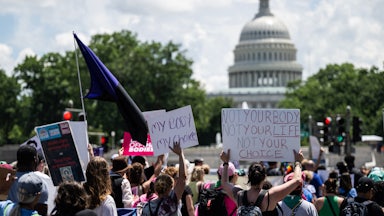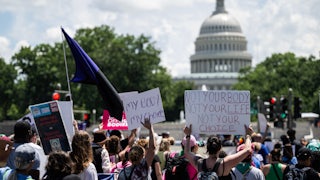From the federal bench in Amarillo, Texas, Judge Matthew Kacsmaryk laid another plank last week in the expanding Christian nationalist platform for the United States, in a ruling favoring a public university president who banned a drag show organized by a campus LGBTQ student group. In this court order, the latest twist in a case filed in March by Spectrum WT, a student organization at West Texas A&M University, Kacsmaryk denied the group’s request to restrain the school’s president and his administration from banning drag while their case is still in process. With Kacsmaryk’s order, we are witnessing the strengthening of the Christian right’s preferred legal reality, in which drag performance is not protected speech or expression under the First Amendment—thanks in part to the (literally) Victorian turn Kacsmaryk has made.
The university president’s drag ban comes as recently passed drag bans in several states face their own legal scrutiny. On Tuesday, Texas’s June 2023 drag ban was ruled unconstitutional, following a similar drag ban that was also overturned earlier this year in Tennessee. Other drag bans in Florida and Montana were also temporarily blocked by courts because of the damage the bans could do in their respective states while these cases were being argued. Kacsmaryk refused to follow suit.
In an order that points to his likely eventual ruling in the Spectrum WT case, Kacsmaryk deploys the same arguments as the Christian-right players behind the drag bans: that drag is “sexualized” expression or conduct, thus a danger to children, and thus fair game for their restrictions. Judge Kacsmaryk does not shy from the source of such spurious reasoning in the written order. He cited not only Christopher Rufo, the self-admitted architect of the moral panic that incited drag bans, but also Gays Against Groomers, the pseudo-grassroots group that claims to be “a coalition of gay people” opposed to “gender identity” (and whose rhetoric neatly follows the rest of the Christian right’s anti-trans rhetoric).
But another curious mention caught my eye in Kacsmaryk’s recent ruling: the Comstock Act. In his ruling, Kacsmaryk asserted that this 1873 law banning the dissemination of information related to sexuality (among many other things) is part of what he termed a “Free Speech ecosystem” that he claims went ignored by the students in their case. Whatever he means by “free speech ecosystem” aside, in reaching back to the Comstock Act—a law that has been chipped away at by the courts since its passage, and remains all but discarded in practice—Kacsmaryk claims to have found justification for excluding drag from constitutional protections.
Yet again, it appears that the Christian right’s latest go-to legal strategy is to summon the ghost of Anthony Comstock, the Victorian era’s arch foe of “obscenity.” It is not even the first time Kacsmaryk has referenced Comstock in a ruling siding with the Christian right. In April, in a case to restrict access to mifepristone argued by the Christian-right law group Alliance Defending Freedom, Kacsmaryk claimed that the Comstock Act may apply when it comes to the legal distribution of the drug, given its prohibitions around mailing anything that may cause an abortion (the Justice Department, it should be noted, had preemptively disagreed with this take). In a sense, by deploying Comstock now against both abortion and drag, Kacsmaryk is picking up on something quite true about the Comstock Act: Abortion, contraception, queerness, transness, sex work, sex ed, all of it is what Comstock was originally seeking to outlaw—and that Victorian sensibility is being resurrected from the dead.
But why revive Comstock now? To understand what Kacsmaryk is doing with the Comstock Act in both the drag and abortion cases, one must look to the Christian-right law projects that have both laid the groundwork for Christian nationalist legal theories and paved Kacsmaryk’s way to the federal bench.
Nearly a decade ago, Kacsmaryk joined the Texas-based First Liberty Institute, or FLI, a group that claims to be the largest legal project in the U.S. “focused exclusively on religious liberty.” From 2014 to 2019, Kacsmaryk was employed as an FLI attorney, where he represented clients fighting “the government’s effort to punish business owners and ministry leaders for following their religious beliefs and moral convictions,” as he said in 2017 after an FLI meeting with the Trump administration. As a lawyer working for the Christian right, Kacsmaryk was part of an effort aimed at rolling back contraception coverage in the Affordable Care Act—a provision that made birth control available to millions of people in the U.S. at no extra charge—on purported “religious liberty” grounds. In the movement for queer and trans rights too, according to Kacsmaryk, “religious liberty” is fundamentally at odds with “sexual liberty.” Since leaving FLI in 2019 to assume his place on the federal bench in Amarillo, coming down on the side of religious liberty is an effort Kacsmaryk can sustain with near-perfect continuity. Now with the power to decide from the front of the courtroom, he is able to tee up such cases for the Supreme Court.
After his nomination, FLI celebrated Kacsmaryk’s lifetime appointment as “a major win for religious-freedom practitioners, proving that a principled attorney may zealously advocate for the rights of … faith-based ministries without forfeiting the opportunity to serve on the bench,” and boasted that “Matthew is the first [emphasis its own] confirmed judge who’s gone directly from a religious liberty law firm to the federal judiciary.” Kacsmaryk’s nomination was not solely thanks to FLI: He also held a leadership position in the Federalist Society, the group that vetted a list of judicial nominees for Trump, curated by its board chair (and “friend” of Supreme Court Justice Clarence Thomas and his wife, Ginni) Leonard Leo. Having a Christian right–friendly judge like Kacsmaryk on a court is a boon to these legal players; having Kacsmaryk on a court in which he hears at least 95 percent of civil cases filed there is only more so.
First Liberty Institute, like the better-known Alliance Defending Freedom, or ADF, imagines that in the U.S., Christians are a persecuted minority. This assertion is something both groups would claim is not representative of their philosophy, pointing to their stated, broader defense of “religious freedom”—which in practice is a “freedom” reserved primarily for those Christians who use their faith as a rationale for violating the Constitution and civil rights protections. FLI’s founding president Kelly Shackelford was among the first on the Christian right to identify the post–Obergefell v. Hodges moment as the opening of a “a new war over religious freedom,” as he wrote in 2015. Within five years, he was declaring victory in that war. Shackelford said he was “watching history change on its axis,” marveling that groups like FLI were now suddenly prevailing—“because of what’s happening with the judges”—reflecting on, as Sarah Posner reported, the success their movement had putting millions of dollars into their crusade, using Trump’s power to stack the judiciary with their own.
Shackelford and FLI have continued to go to bat for the man who won for their side with “their” judges. They’ve even helped to substantiate Trump’s conspiracy theories about a stolen election: Shackelford joined a December 30, 2020, letter from a number of Christian-right groups that advanced Trump’s “fake electors” scheme to overturn the results of the 2020 presidential election, and asked Senate Republicans to contest legitimate electoral votes, claiming that there was “substantial evidence” of “large numbers of illegal votes” (which there was not). Today, FLI is part of a group preparing the way for Trump’s return, the 2025 Presidential Transition Project, an effort led by the Heritage Foundation. It is a plan for overhauling the government as they see fit, starting from day one; it’s authoritarian in scope and features a “top to bottom overhaul” of the Justice Department, including demands to prosecute anyone providing medication abortion by mail, as well as classifying as “sex offenders” those who distribute what the plan deems “pornography”—which it claims is “manifested today in the omnipresent propagation of transgender ideology and sexualisation of children.” It’s a project already in progress.
Little of this powerful backstory is apparent in the federal courthouse in Amarillo when Judge Kacsmaryk is at work. Likewise, it’s not immediately obvious what the Christian right of today, from its wealthy backers making martinis from glacier ice with Supreme Court justices, to its prayerful warriors engaged in combat outside the Capitol on January 6, has to do with Anthony Comstock. That man died in 1915, leaving behind less a legacy and more a joke in the periodic usage of the term Comstockery to denote censorious impulses. Matthew Kacsmaryk, on the other hand, was only born in 1977, and he will most likely have many more decades on the bench in service to the Christian right.
How much does it cost to buy a federal judge? How much to buy one willing to raise Anthony Comstock from the dead? I sincerely suspect Kacsmaryk might throw that summoning in for free.












